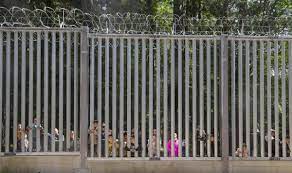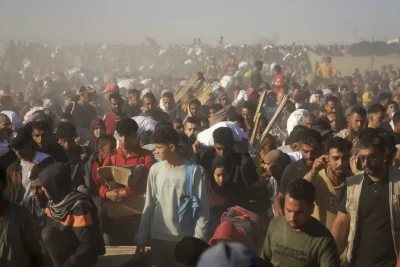
Poland’s President Andrzej Duda said Thursday he was awaiting the results of an investigation into allegations that Polish consulates sold temporary work visas to migrants for thousands of dollars, just weeks before the strongly anti-migration ruling party seeks re-election for a third term.
Media reports allege Poland’s consular sections issued some 250,000 visas to migrants from Asia and Africa since 2021 in return for bribes.
Asked about the reports, Duda said he could “not disclose the details related to my knowledge about the suspicions of such practices.”
He said he was waiting for the result of the investigation, adding that “according to my knowledge, at least some of the information in the media is untrue.”
Prosecutors and the state Anti-Corruption Office said Thursday that seven people — none of them state officials — had been detained on suspicion of corruption in the process of issuing a few hundred temporary work visas. They said the investigation began in July 2022 and was ongoing.
Poland’s main opposition leader, Donald Tusk, called it “probably the biggest scandal in Poland in the 21st century.”
He asked Poland’s top politicians how long they had known about these practices, who in the government profited and where Wawrzyk was now.
Tusk, a former prime minister and EU president, addressed the questions to Duda and the ruling Law and Justice party leader Jaroslaw Kaczynski, who is chief policy maker. He also sought answers from Prime Minister Mateusz Morawiecki and the foreign and interior ministers.
According to Onet.pl, a news website, Wawrzyk personally insisted that temporary work visas be issued to groups of people from India, who posed as crews working for the Indian movie industry, popularly known as Bollywood.
The allegations could seriously hit the conservative ruling party ahead of next month’s parliamentary elections. Law and Justice, which has put opposition to migration at the center of its policies, wants to win an unprecedented third term in power in the Oct. 15 vote.
Opinion polls suggest the party will win most votes, but probably not enough to govern single-handedly or with its current allies.
Poland’s populist government has repeatedly refused to admit migrants within an EU burden-sharing program. It spent about 1.6 billion zlotys ($380,000) last year on a massive wall along the border with Belarus, intended to block the inflow of Middle East and African migrants. Reports say the inflow was reduced but not fully stopped.
After Russia’s invasion of Ukraine in February 2022, Poland opened its border to millions of refugees, offering them accommodation and jobs. Some 1.3 million Ukrainians — mostly women and children — are registered as residing in neighboring Poland.





